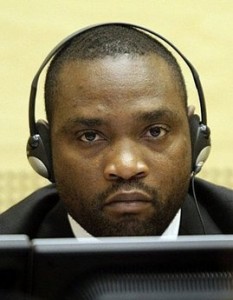
THE HAGUE (AFP) – Two Congolese militiamen pleaded not guilty on Tuesday as they were accused in The Hague of plotting to wipe out a village where their forces killed civilians, raped women and enslaved child soldiers.
“Germain Katanga and Mathieu Ngudjolo Chui are responsible for some of the most serious crimes of concern to the international community,” prosecutor Luis Moreno-Ocampo told judges of the International Criminal Court as the trial opened.
“They used children as soldiers, they killed more than 200 civilians in a few hours, they raped women; girls and the elderly, they looted the entire village and they transformed women into sex slaves.”
Katanga, 31, and Ngudjolo, 39, stand accused of planning the attack on February 24, 2003 on the village of Bogoro in the Democratic Republic of Congo’s northeastern Ituri region.
The prosecution says more than 1,000 fighters of Katanga’s Patriotic Resistance Force in Ituri (FRPI) and Ngudjolo’s National Integrationist Front (FNI), many of them child soldiers, entered Bogoro in the early morning hours.
“The plan was to wipe out Bogoro,” said Moreno-Ocampo.
“They killed without distinction. Some were shot in their sleep. Some were cut up with machetes to preserve bullets. Others were burnt alive after their houses were set alight.
“Troops of the accused first raped and then killed women.”
The militia also captured children to swell their ranks of child soldiers, and took women as sex slaves.
The 6,000-strong population of the village was reduced by half as many fled, according to the prosecution.
“Germain Katanga and Mathieu Ngudjolo planned the attack, they were the top commanders of the troops that killed, raped and pillaged,” said Moreno-Ocampo.
Katanga and Ngudjolo responded “I plead not guilty” to each of the 10 charges of war crimes and crimes against humanity read out in court.
Katanga’s role, said his lawyer David Hooper, “was merely to defend his own people”, accusing neighbouring Uganda of fueling the Ituri conflict through its “plunder” of the area’s natural resources.
“The defence disputes that Germain Katanga … planned the attack or that he participated in it,” said Hooper.
Jean-Pierre Kilenda, for Ngudjolo, said his client had a “clear conscience” and “was never involved personally or through intermediaries in the attack on Bogoro.”
Until the attack, Bogoro had been controlled by rival Thomas Lubanga’s Union of Congolese Patriots (UPC), which Katanga and Ngudjolo claim was backed by Uganda — blocking FRPI and FNI fighters from the road to the key city of Bunia.
The two accused are of Lendu and Ngiti ethnicity, while the Bogoro inhabitants were mostly Hema. Rival Lubanga’s war crimes trial, the ICC’s first, started in January.
Non-governmental bodies claim that inter-ethnic and militia violence in Ituri is about control of the area’s rich mineral resources and has claimed 60,000 lives since 1999.
“The victims have been waiting for more than six years for justice,” said Jean-Louis Gilissen, a legal representative for ten former child soldiers granted victim status by the court.
“These children do not understand what happened; their childhood snatched away for a descent into hell.”
Fidel Luvengika, who represents about 330 other victims at trial, said his clients “lost everything. This is not due to a natural disaster, but as a result of human actions”.
His clients expected the court to help discover the truth of what happened, Luvengika said, to punish those responsible and to determine reparations to be paid.
Katanga was surrendered by the DR Congo government to the ICC in October 2007, while Ngudjolo was arrested and sent to The Hague in February 2008.
Their trial is the ICC’s second and its first for murder since opening as the world’s first permanent and independent war crimes tribunal in 2002.